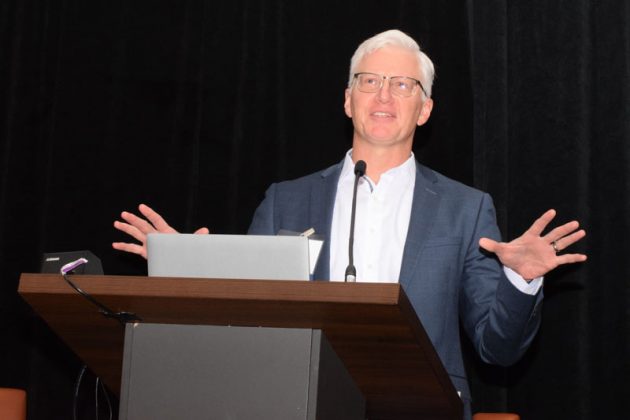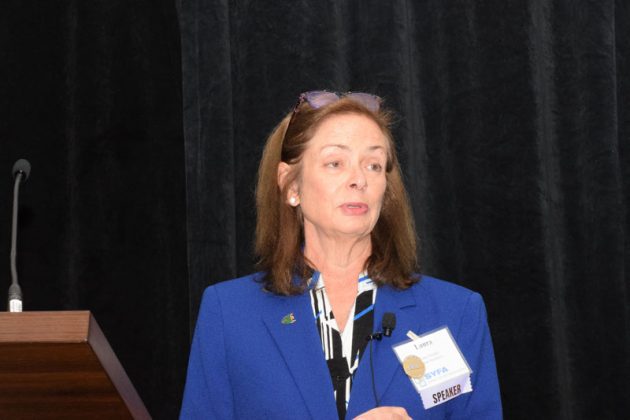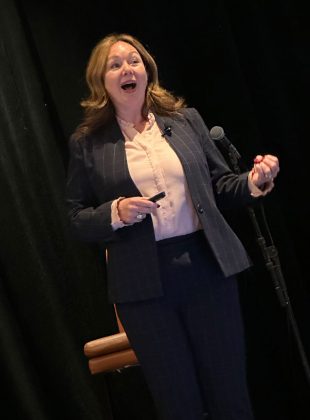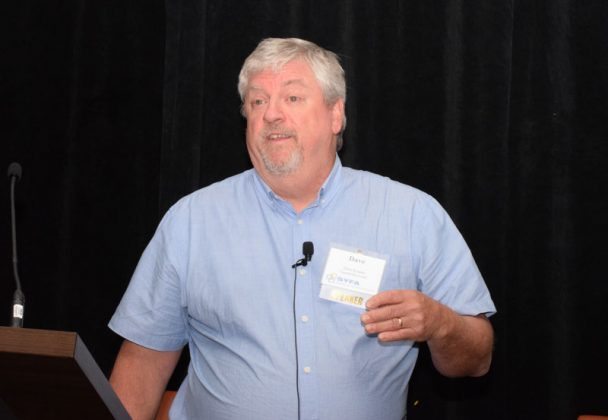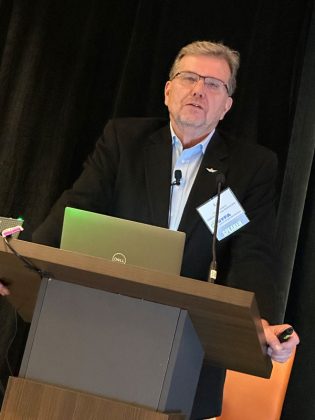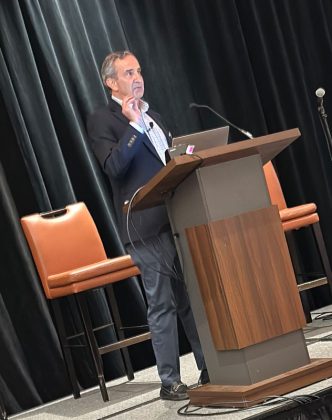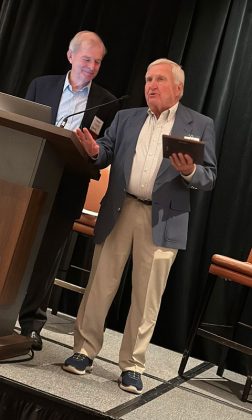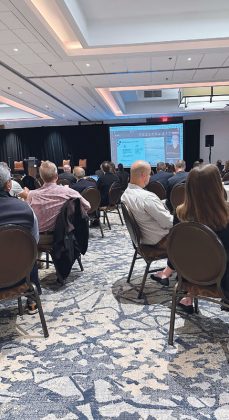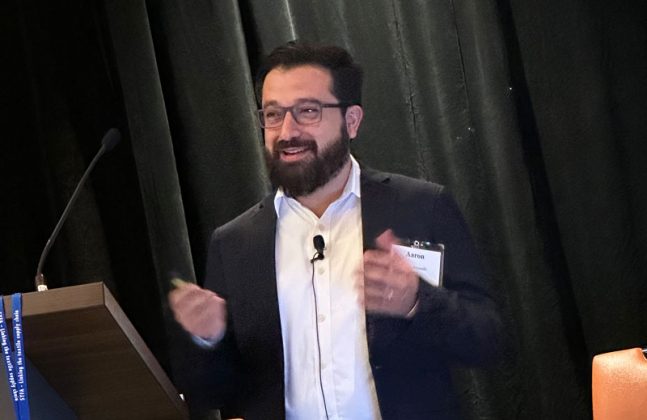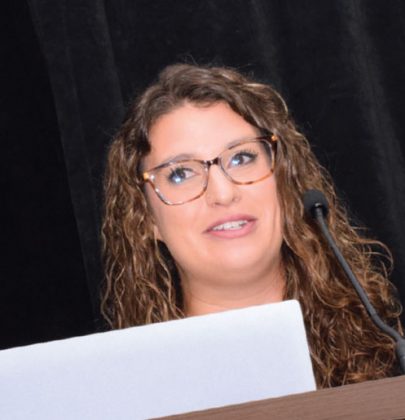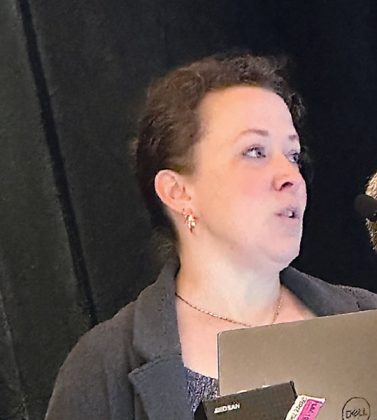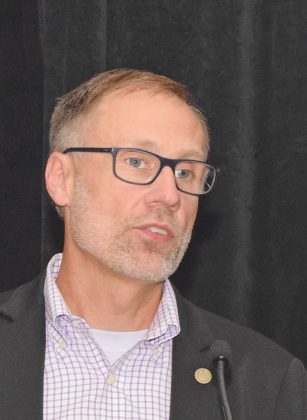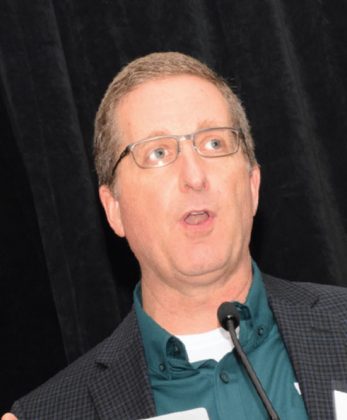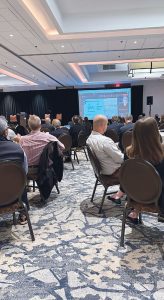 The SYFA’s fall conference took a deep dive into recycling and sustainable technologies in the man-made fiber sector.
The SYFA’s fall conference took a deep dive into recycling and sustainable technologies in the man-made fiber sector.
TW Special Report
The Synthetic Yarn and Fabric Association (SYFA) held its 2023 fall conference recently at the Sheraton Charlotte Airport Hotel, Charlotte, N.C. The format differed slightly from typical meetings. It began with single presenters speaking on a variety of topics under the theme “Reimagining Fibers, Factories and Waste.” The intent of the conference was to take a deeper dive into recycling and sustainable technologies in the man-made fiber sector.
Laura Murphy, Wood Mackenzie, kicked off the presentations with a data-driven “Fiber and Yarn Update.” She was followed by Parkdale’s Cheryl Smyre who presented an update on CiCLO® technology to attendees in her talk titled “Biodegradable Technology to Reduce the Impacts of Synthetic Microfiber Pollution.” After a networking break, Dave Kasper with Canada-based General Recycled, talked about his company’s unique recycling process developed to keep non-biodegradable flame-resistant (FR) garments out of landfills. The presentation, titled “Closed Loop Recycling of Aramid Garments at the End of Their Lifecycle,” provided an interesting look at the process that begins with FR garments at the end of their lifecycle and ends with new FR garments made using recycled aramid yarns. Rounding out day one of the conference was Lee E. Moritz Jr. with the NC Military Business Center who provided attendees helpful information on how to go after Federal contracts in his presentation “Introduction to Federal Contracting.”
After dinner, attendees heard from Keynote Speaker Augustine Tantillo from consulting firm SRG & Associates. Rieter’s Jerry Eskew, who is retiring, was also was recognized for his 47 years of service to the SYFA. For most of his time as a member, Eskew served on the association’s board.
The second day of presentations began with Bruno Langlois, business development and partnership director with France-based Carbios. He joined the conference via an online video call from France to deliver his presentation about “Enzymatic Recycling,” which focused on Carbios’ enzyme technology for depolymerizing polyethylene terephthalate (PET) in a circular manner with no loss of quality. Carbios recently obtained building and operating permits for the world’s first biorecycling plant in Longlaville, France, which is expected to be operational in 2025.
Langlois was followed by Aaron Alvarado, with Germany-based Setex, a supplier of controls, sensors and camera measurement technology, and planning and manufacturing software for textile machinery manufacturers. Alvarado presented on the topic of “Transformation in Textile Manufacturing from Automation to Digitalization.”
The final session was arranged as a panel discussion led by moderator Alasdair Carmichael, a long-time SYFA board member and program director at the National Association for PET Container Resources (NAPCOR). The panelists — Raymond Randall, WM (Waste Management); Megan Helton, Eastman; Chad Bolick, Unifi; and Sarah Coulter, Accelerating Circularity — offered expertise in collection and logistics, molecular and mechanical textile recycling, as well as ongoing actions downstream in the textile recycling sector. After each panelist gave a short presentation about his or her company and its recycling journey, the group discussed the ideas of collection, sorting and end-of-life treatment as it relates to textile recycling. Information shared and discussed included:
- It is estimated that 92 million tons of textile waste is generated each year by the apparel industry;
- Some 15 percent of all fabric delivered into the apparel supply chain ends up as waste on the cutting room floor; and
- Of all garments produced, 30 percent are not sold at retail and must be disposed of some way.
Moderator Carmichael warned attendees that legislation is coming and that the textile and apparel industry needs to be involved in writing the legislation or rules will be created that are not at all favorable to the industry.
Conference sponsors included Diamond Sponsor Premier Fibers Inc.; Gold Sponsor Goulston Technologies; Silver Sponsor Pulcra Chemicals LLC; Bronze Sponsors Polyspintex and Unifi Inc.; and Keynote Sponsors Measured Solutions Inc. and Milliken & Company.
“On the heels of a successful 50th anniversary celebration last year, the 2023 Fall Conference shined a light on what’s ahead for the next few decades,” said SYFA President Hardy Sullivan. “The synthetic yarn and fabric industry has experienced an evolution of ways North American companies try to set themselves apart. Over the years we’ve seen a gradual transition of focus — from throughput to quality to recycled content; and now there is emphasis on minimizing resources and circularity. To recognize we’ve reached an inflection point, the conference theme was ‘Reimagining Fibers, Factories and Waste.’ We had a great lineup of speakers and panelists that revealed ways to modernize, expand into new markets, and make our industry more sustainable by using materials and processes that allow synthetics to biodegrade or be recycled at large scale. SYFA has reached its 51st year but, in many ways, we’re just starting a new chapter.”
The next edition of the SYFA conference will be held April 18-19, 2024, at the Sheraton Charlotte Airport Hotel. The association is planning its second annual golf outing the day before the conference, on April 18, to raise money for the SYFA Scholarship Fund for Gaston Community College’s textile program. Lauren Eck, the first recipient of SYFA’s scholarship, was in attendance at the fall meeting.
November/December 2023

